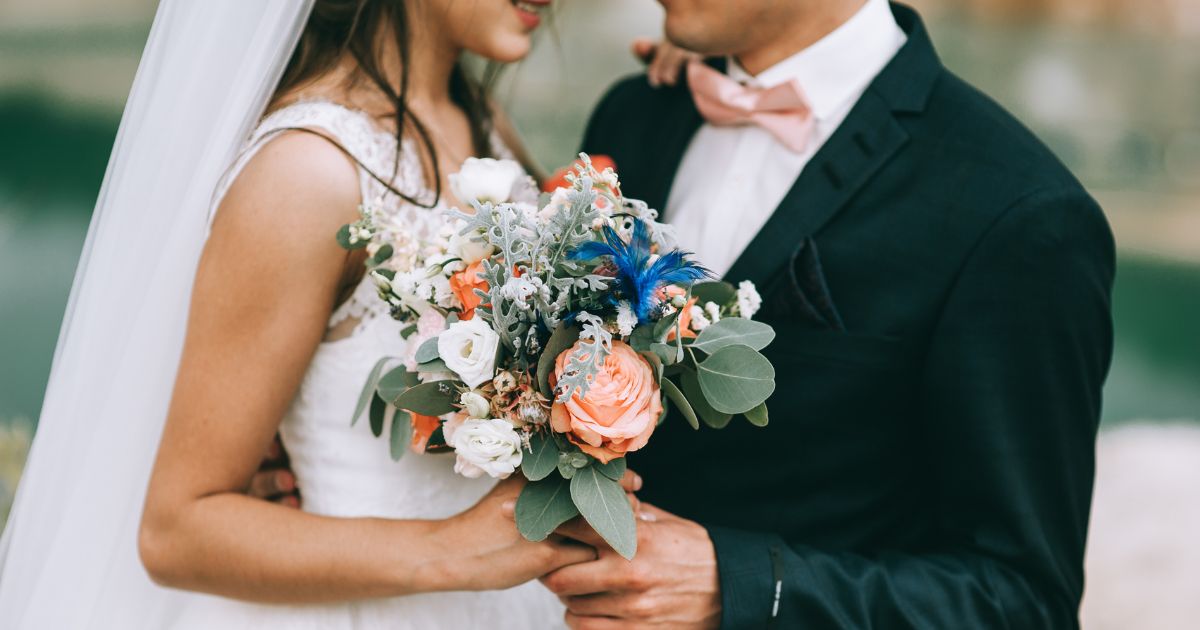 Congratulations on your engagement! After you tell your close friends and family the news, you might have some questions running through your mind. “Should we have our wedding at an elegant ballroom or the traditional winery outside of town? Do we need gourmet cupcakes if we have a four-tiered cake?” And lastly, “How are we going to pay for everything?” Since the average cost of a wedding in 2023 was $35,000, it’s more important than ever to plan the perfect wedding for you and your finances. Here are some helpful tips for paying for your special day.
Congratulations on your engagement! After you tell your close friends and family the news, you might have some questions running through your mind. “Should we have our wedding at an elegant ballroom or the traditional winery outside of town? Do we need gourmet cupcakes if we have a four-tiered cake?” And lastly, “How are we going to pay for everything?” Since the average cost of a wedding in 2023 was $35,000, it’s more important than ever to plan the perfect wedding for you and your finances. Here are some helpful tips for paying for your special day.
1. Make sure you and your partner are on the same page
Some people have a Pinterest board titled “Dream Wedding”. Yet, few get to make all of their elaborate Pinterest wedding ideas come to life. In reality, a couple may have different spending habits and financial obligations that determine how much they can spend. Your partner may have outstanding student loans or want to spend more money on the honeymoon than the reception.
Before assuming your partner has the same ideas as you about your wedding, you should ask. It is important to understand each other's perspectives and priorities when spending money on such a significant event. Learning how to have money conversations with your partner is important for planning the wedding. By getting on the same page, you can avoid misunderstandings and work together to plan a wedding that aligns with both of your values.
2. Consider any family contributions
There are many traditions about who should pay for certain parts of the wedding. As weddings become more modern, those traditions often go ignored. It is no longer expected that the bride’s family be the ones to cover the full cost of the celebration. Nowadays, both families may chip in, or the couple may pay for all the wedding expenses using their own money.
You should talk to both of your families to understand if they intend to help cover none, some, or all of the costs. It's important to have an open conversation with your parents regarding any financial contributions to the wedding. By understanding their intentions, you can plan accordingly and make decisions that align with everyone's expectations and budget.
3. Set a wedding budget (and add wiggle room)
Once you decide on a total wedding cost that you are both comfortable with, you should create a wedding budget. The budget will allow you to break down the total cost into smaller, more manageable expenses, such as the venue, catering, photography, decorations, attire, and entertainment. After researching the prices of wedding services in your area, you’ll have a realistic idea of how much to allocate to each element.
It's smart to include some wiggle room in your budget, as unexpected expenses can arise when planning a wedding. These unforeseen costs can range from weather-related adjustments, like suddenly needing a tent for an outdoor wedding, to other last-minute add-ons, like upgrading your photography package to include videography. By adding a little financial cushion to your budget, you can better prepare for any surprises that may come your way.
4. List out your priorities
You may get your wedding planning inspiration from bridal magazines, Pinterest boards, and even your friends’ weddings. While it’s good to see which elements of a wedding you like, it's even more important to align your priorities and wedding vendors with your budget. By listing out your priorities, such as your dream venue, preferred photographer, or specific details like live music over a DJ, you can determine where to allocate your budget most effectively.
Consider which aspects of your wedding hold the most significance to you. It may be the venue, entertainment, guest list, or another sentimental detail. Knowing your non-negotiables can help you make informed decisions that align with your vision for the day. You might have to switch out the items that aren’t a priority for less expensive alternatives to save money for the things that matter most. This thoughtful planning can help you make the most of your budget while still achieving the wedding you've always envisioned.
5. Keep your wedding to a realistic size
You may picture yourself at the altar with only your friends and family supporting you. Yet, when you start sending out invites, you may think you’re forgetting someone. Soon enough you’ve invited your sixth cousin on your mom’s side, your fourth-grade teacher, and your entire neighborhood. Although adding more people to the list seems insignificant at the time, it can add up quickly. After all, that’s another save the date, wedding invitation, ceremony program, meal, piece of cake, etc.
Ultimately, you get to decide whether you want a big wedding with all your extended family and friends or an intimate wedding with just your immediate family and close friends. A 2023 wedding report revealed that the average size for a wedding in the U.S. was 115 guests. By keeping your wedding to a realistic size, you can keep your costs at a more manageable level. Whatever number you and your partner decide on, make sure that it is feasible for your budget.
6. Find the best payment option
Once you have an estimate of the costs, you need to consider your payment options. The most ideal way to pay for your wedding is to use the money you have tucked away in your dedicated wedding fund. While ideal, savings isn’t the only way to cover the costs of your big day. Some couples use credit cards for specific wedding expenses. They then ensure the balance is paid in full with a lump sum. If you choose this payment option, make sure you only charge to your card what you can pay back.
Other couples may consider a wedding loan, which is a personal loan from your bank that you must make monthly payments on. Generally, financial advisors don’t recommend that you finance your wedding in this manner. Since your wedding is likely the priciest party you will throw in your life, it’s understandable that you might be stressing about money. Don’t be afraid to take some time and explore the best payment options for you and your fiancé.
7. Negotiate a longer engagement
Considering that the average wedding costs are steadily rising, giving yourself more time to start saving up for your wedding day can be a wise decision. For a newly engaged couple, selecting a date further in the future can help you spread out your expenses and avoid the need to apply for a wedding loan with a high interest rate or accumulate credit card debt. This approach allows you to focus on making thoughtful choices without financial stress looming overhead.
Additionally, having a longer engagement period can allow you to explore different budget-friendly options, like thrifting your centerpieces or asking your uncle to build some wooden arches for a photo backdrop. You’ll also have more time to compare prices or take advantage of seasonal discounts offered by vendors. Ultimately, giving yourself a long time to save for your wedding can lead to a more financially sound and memorable celebration that starts your marriage off on the right foot.
8. Be willing to make financial sacrifices
If having your dream wedding is a priority, you might have to be willing to make some financial sacrifices. To put more money towards your wedding fund, check to see if there are any expenses you can eliminate from your everyday life. If you have a cable TV, Spotify Premium, Hulu, or another monthly subscription, consider making a few cancellations in order to save money before the wedding. Going without these expenses will add to your savings. The same goes for impulse purchases, such as purchasing coffee every morning or eating out multiple times each week.
While you’re planning your wedding, you will likely still have other long-term financial goals. You won’t want to pause your other financial goals, like making contributions to retirement plans or saving to buy your first home. However, it will be a balancing act. Consider using a separate bank account for your wedding savings. This can be a joint account with your partner, if you decide. Keeping your wedding money in a separate account means you will be less likely to spend it on something other than your wedding.
Remember, a wedding is a very special occasion, but it's also just one day in the rest of your lives together. Finding a balance between creating a memorable event and staying within your financial means is key to throwing a great party. So, whether you decide on cupcakes, cake pops, or traditional cake, you will know that you’re choosing what’s best for both your personal finances and the perfect day. Good luck with your wedding planning!
WHAT'S NEXT?💍You can save for a wedding while still having fun. View our Cheap Date Ideas. 👶As the old saying goes, first comes love, then comes marriage. To make sure your budget is ready for the baby in a baby carriage, read How to Prepare For a Baby Financially. |














